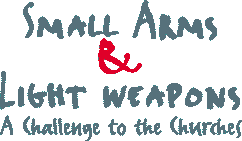
Liberia, Sierra Leone -- these smaller West African states along with their larger counterparts
such as Mali and Nigeria have become known world-wide as countries embroiled in armed conflict.
On 31 October 1998, the 16 Heads of State in the Economic Community
of West Africa (ECOWAS) declared a three-year moratorium on the import,
export and production of small arms in the region. In so doing, West
Africa became the first, and thus far only, region in the world to announce
a halt to further light arms procurement.
Churches in West Africa played a significant role in promoting the initiative.
The proliferation of small arms and light weapons in the region has
been both a cause and an effect of pervasive conflicts.
As a cause, the extensive circulation and easy accessibility
of weaponry such as assault rifles and grenades has fueled an instinct
to solve problems with bullets and increased the number of violent crimes,
thus further destabilizing already vulnerable states. As an effect,
the proliferation of small arms and light weapons is compouned after
wars have drawn to a close leaving many armed ex-combatants without
work or income. |
 Visit the Norwegian Initiative on Small Arms Transfer (NISAT) for more information about the moratorium, further political developments and related news from the region. |
In September 1998 the World Council of Churches, in conjunction with the
Fellowship of Christian Councils of West Africa (FECCIWA) and the Norwegian
Initiative on Small Arms Transfers (NISAT), held an ecumenical consultation
with churches in the region on the issue of microdisarmament. At the consultation,
strong support developed for the regional ban. "We are horrified by the
fact that the proliferation of small arms in the sub-region has caused
the untimely death of about two million people since 1990", participants
noted.
"As people of God, we cannot be silent about this great menace to the life and the proper ordering of society. We therefore call on churches of the sub-region to join hands with other organizations and address this problem which is threatening human life and undermining the conditions for development in our region".In a final communique the participants of the consultation stated their firm support for the moratorium. They called for the collection of arms from ex-combatants and the reallocation of national funds from military budgets to education and health. The participants also stated that "as part of her responsibility to civil society, the church should be in the forefront, advocating and lobbying for laws and legislation for tighter control of small arms and light weapons". The work of ecumenical organizations to overcome the small arms problem in West Africa continues today, as church partners have led the way recently for the formation of the West African Action Network on Small Arms (WAANSA) and the soon to be launched (October 2002) Sierra Leone Action Network against Small Arms (SLANSA). In November 2002, the World Council of Churches, in cooperation with FECCIWA, will host another regional consultation in Abokobi, Ghana, to discuss the role of ecumenical organizations in combating the proliferation of small arms and helping communities cope with the results of their use.
|
Return to Challenge to the Churches -- stories of hope
© 2001 world council of churches | remarks to webeditor